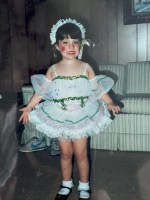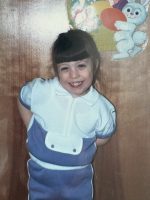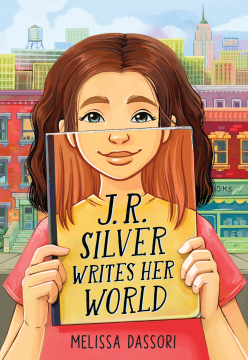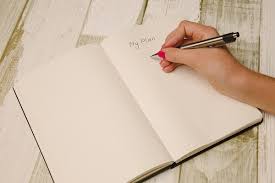
by Bethany Rogers
We’re excited to have Jamie Sumner on here today to talk about her new release: Schooled. The title intrigues me so much, I can’t wait to find out more.
Hi, Jamie, thank you so much for joining us here today. We’d like to learn more about you, and then we’ll talk about your book.
Did you love to read as a child? If so, can you tell us some favorite books?
I absolutely loved to read. My brother is twelve years older than me, so I was basically an only child with a very active imagination. On top of that, my mom was my elementary school librarian! Every book fair, she would let me pick as many books as I wanted and stack them next to her desk. It was heaven. I loved The Boxcar Children and The Baby-sitters Club series.
What an ideal job for the mom of a book lover to have! That would have been heaven.
With so many books at your disposal, I’m sure you learned how powerful writing could be. What was an early experience where you learned that written language had power?
When I was in fourth grade, my teacher assigned our first short story. I don’t remember the requirements, but I remember that mine was ten pages and everyone else’s was around two! I found it a few years ago, and it was pretty dark for a nine year old – about an elephant that escaped a zoo in India. I don’t think I’d ever seen an elephant in real life, and I had definitely never been to India. But the power of this anecdote comes from what my teacher wrote at the top of my story. She wrote, “You are a writer” – not, you will be a writer if you do x,y,z, but that I was one already. I’m pretty sure her words changed my life.
That’s an amazing compliment, and it shows how much impact teachers can have. It’s such wonderful, positive encouragement. I’m sure she’d be pleased to know how many books you’ve written.
Those elementary years can also be filled with many other emotions, including fear and embarrassment. What was your biggest fear when you were young? Did you get over it?
Honestly, I think my biggest fear was that people wouldn’t like me. It seems silly, but I felt like if I really showed my true self, people would think I was weird or “too much.” It’s easier now that I’m in my forties, but it’s also harder with social media. It is so easy to compare to someone else’s home life or career. Luckily, I have a core of good people around me, and I am pretty good at reminding myself of my values, when I start to feel angsty about it all.
Would you be willing to share an embarrassing grade school moment?
This is going to sound so small, but it felt SO BIG. One of my friends had a sleepover and almost every girl in the grade was invited. It was awesome. We roller skated and watched movies (that we rented from Blockbuster) and then we all slept in sleeping bags in her living room.
Well, the next morning, I woke up, and a few girls were laughing and whispering – you know that whisper you just feel is about you and not nice. Turns out, they said I snored and when I did my lip curled up, and because I had a short haircut, I looked like Elvis. For the rest of the school year, those few girls called me Elvis.
It felt so unfair that I got a mean nickname because of something I did in my sleep.
I can totally understand why it felt so big. It sounds very painful and sad. Unkind teasing like that really hurts. And for them to keep it up so long makes it even more mean. It’s good when you could put it behind you as you grew up. Luckily, your teacher’s encouragement spurred you to continue writing and you turned your talents into a wonderful career as an author.
Can you tell us your favorite or most challenging part of being a writer?
My absolute favorite writing is the first draft – it goes the fastest and everything feels brilliant and nothing feels so precious that you can’t cut it or change it later. I wake up in the middle of the night texting myself dialogue, and things that happen in my day sneak into the part of the story I’m working on. This is the part that feels like magic.
The hardest part for me is the big letter I get from my editor with the long list of big and small things that need fixing. It can be anything from major character or plot issues or small line-by-line fixes, and it feels so massive that if I let it sit for too long, it feels impossible. I have to jump in before the weight of it gets to me.
Edits can be tough and overwhelming to face. I’m glad you’ve found a way to get started on the revisions.
Have you had any careers besides writing?
Oh yes. This is my favorite thing to tells kids when I do author visits. You DO NOT HAVE TO KNOW what you want to be when you grow up! We are all always growing up! Your wants and skills will change. First, I worked for a publishing company in New York. Then I worked for a bakery. Then I went back to school and got my Masters in Education and taught high school English for over a decade. It was only after that when I became a full-time author.
It’s been fun getting to know about your journey as an author. Now we’d love to hear more about Schooled. Can you tell us about it?
Schooled actually pulled a lot from my former career as a teacher. In the story eleven-year-old Lenny and his father have just uprooted their lives to move to a college campus where his dad will be a professor. Lenny and a bunch of other professors’ kids become part of an experimental middle school. The catch is, Lenny is in deep, deep grief over the loss of his mom and he’s not sure he’s up for this new life.
This novel is an exploration of what school could and should be and also what it looks like for different people to grieve and how we heal. Lenny makes some incredible friends, and it was pure joy for me to set a group of preteens loose at college.
Are any characters based on anyone you know?
There is an old professor in Schooled named VW and he is absolutely modeled after my favorite professor in college whom we affectionately called VB. VW loves talking literature and challenging norms and holding office hours in the divinity school cafeteria because “they serve the best food on campus.”
Do you have any message or advice for the teachers and parents who will be sharing your book with their students and families?
There is a part in this book where Lenny and his friends take a test called the Four Tendencies. It’s a real thing by Gretchen Rubin, and I would encourage any teacher to let their students take it. It tells you a great deal about how you approach life and educational tasks. I’d also tell any aspiring writers to have their characters take the test! It will show them what their character’s motivations are so they can have them make authentic decisions.
What do you hope readers will take away from your book?
I hope readers will remember that grief is not linear, and we all approach it in our own way at our own pace and that the best thing you can do is to talk it through with people you trust.
Can you tell us about some of your other books?
I have my first picture book coming out in the spring of 2026! A Fish Like Me takes place entirely under water as we follow one boy as he pretends to be all different sea creatures. It is only later that we discover he uses a wheelchair and is in swim therapy. It is a beautiful celebration of all the different ways that bodies can move.
What a wonderful way to explore swim therapy from a child’s point of view. I’ll look forward to that coming out. Are you working on any other books now?
I am finishing up page proofs on my third novel in verse Glory Be which will also be out in the spring of 2026. It follows Glory as she searched for her lost dog Roux all over the city of New Orleans. The entire thing takes place over five days and it is so fun and fast-paced and full of the vibrant culture of NOLA.
Good luck with finishing Glory Be. Novels in verse are so challenging to write, but so lovely to read. And New Orleans is a fun setting, so we’ll look forward to its release.
And thank you so much for agreeing to this interview, Jamie. I know our young readers, as well as teachers and librarians will enjoy learning more about you and your books. And I’m sure they’ll be excited to get a copy of Schooled.
ABOUT THE BOOK
Eleven-year-old Lenny Syms is about to start college—sort of. As part of a brand-new experimental school, Lenny and four other students are starting sixth grade on a university campus, where they’ll be taught by the most brilliant professors and given every resource imaginable. This new school is pretty weird, though. Instead of hunkering down behind a desk to study math, science, and history, Lenny finds himself meditating, participating in discussions where you don’t even have to raise your hand, and spying on the campus population in the name of anthropology.
But Lenny just lost his mom, and his Latin professor dad is better with dead languages than actual human beings. Lenny doesn’t want to be part of some learning experiment. He just wants to be left alone. Yet if Lenny is going to make it as a middle schooler on a college campus, he’s going to need help. Is a group of misfit sixth graders and one particularly quirky professor enough to pull him out of his sadness and back into the world?
ABOUT THE AUTHOR
Jamie Sumner is the author of Roll with It, Time to Roll, Rolling On, Tune It Out, One Kid’s Trash, The Summer of June, Maid for It, Deep Water, Please Pay Attention, and Schooled. Her work has appeared in The New York Times, The Washington Post, and other publications. She loves stories that celebrate the grit and beauty in all kids. She is also the mother of a son with cerebral palsy and has written extensively about parenting a child with special needs. She and her family live in Nashville, Tennessee. Visit her at Jamie-Sumner.com.












 Today, authors Dylan Thuras and Jen Swanson stop by to chat with Melissa Roske about their forthcoming collaboration,
Today, authors Dylan Thuras and Jen Swanson stop by to chat with Melissa Roske about their forthcoming collaboration, 





